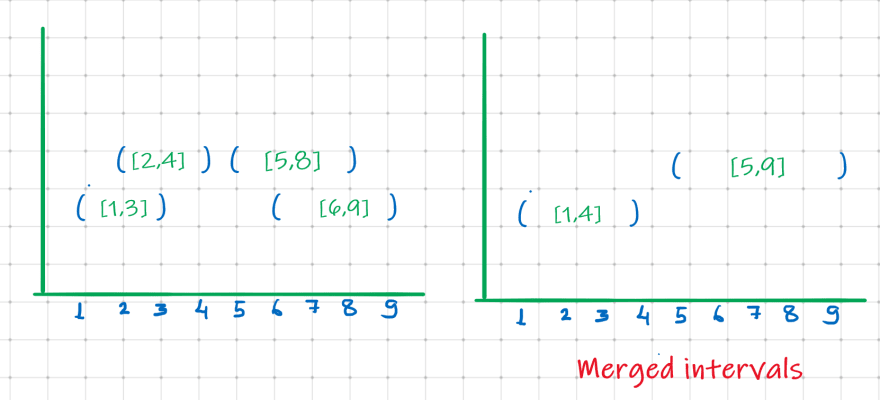This content originally appeared on DEV Community and was authored by Trung Nguyen
Last week, I had an interview, there's an algorithm test which I met it again next week when I was working in the current React project. Instantly, I recognized it and solved it "like eat a cake". This just reminds me one of my favorite quotes.
The algorithm dot - Merge Intervals
You can see details here in LeetCode.
Example 1:
Input: intervals = [[1,3],[2,6],[8,10],[15,18]]
Output: [[1,6],[8,10],[15,18]]
Explanation: Since intervals [1,3] and [2,6] overlaps, merge them into [1,6].
Example 2:
Input: intervals = [[1,4],[4,5]]
Output: [[1,5]]
Explanation: Intervals [1,4] and [4,5] are considered overlapping.
A picture says a thousand words
Connecting to Front-end
So, how this algorithm test I took last week related to my current work. Let's see a gif below
A gif says a million words.
Try it yourself ⇒ codesandbox
- There's a list transactions grouped by date.
- At first load, we only load a few items.
- When users press "Load More" button, we call an api to get more data.
- Data come but in section date "19.10.2021", without merge we see two separate sections.
- Now my mission is to merge theme together. Let's go
Connecting The Dots
This is the solution
const merge = (currentList, newList) => {
// We take the currentList at first load, and the "load more" list.
// First we just merge it by spread operator => [...currentList, ...newList]
// After that we use `Array.prototype.reduce` to generate a new array,
// Which is merged and grouped by date.
const merged = [...currentList, ...newList].reduce((acc, item) => {
// Condition 1: just push the item to the new empty array, or
// if the last item in `acc` doesn't have the same date with the current item
if (!acc.length || acc[acc.length - 1].date !== item.date) {
acc.push(item);
} else {
// Condition 2: if they have the same date, we merge it. ?
const lastItem = acc[acc.length - 1];
const mergedDate = [...lastItem.transactions, ...item.transactions];
lastItem.transactions = mergedDate;
}
return acc;
}, []);
return merged;
};
const result = await fakeAPIRequest(page);
setMergedList((prevList) =>
merge(cloneDeep(prevList), cloneDeep(result.items))
);
So, this is a little bit different from the algorithm test, but the idea is the same. Now, you can come back to Leetcode and let's solve it by yourself.
Algorithm test is nightmare sometimes, and we often underestimate because in real-life project we barely think or use it. This experience makes me think differently and inspires me to practice more in next weekends.
This content originally appeared on DEV Community and was authored by Trung Nguyen
Trung Nguyen | Sciencx (2021-04-17T12:36:26+00:00) Connecting The Dots: Front-end and Algorithms. Retrieved from https://www.scien.cx/2021/04/17/connecting-the-dots-front-end-and-algorithms/
Please log in to upload a file.
There are no updates yet.
Click the Upload button above to add an update.



